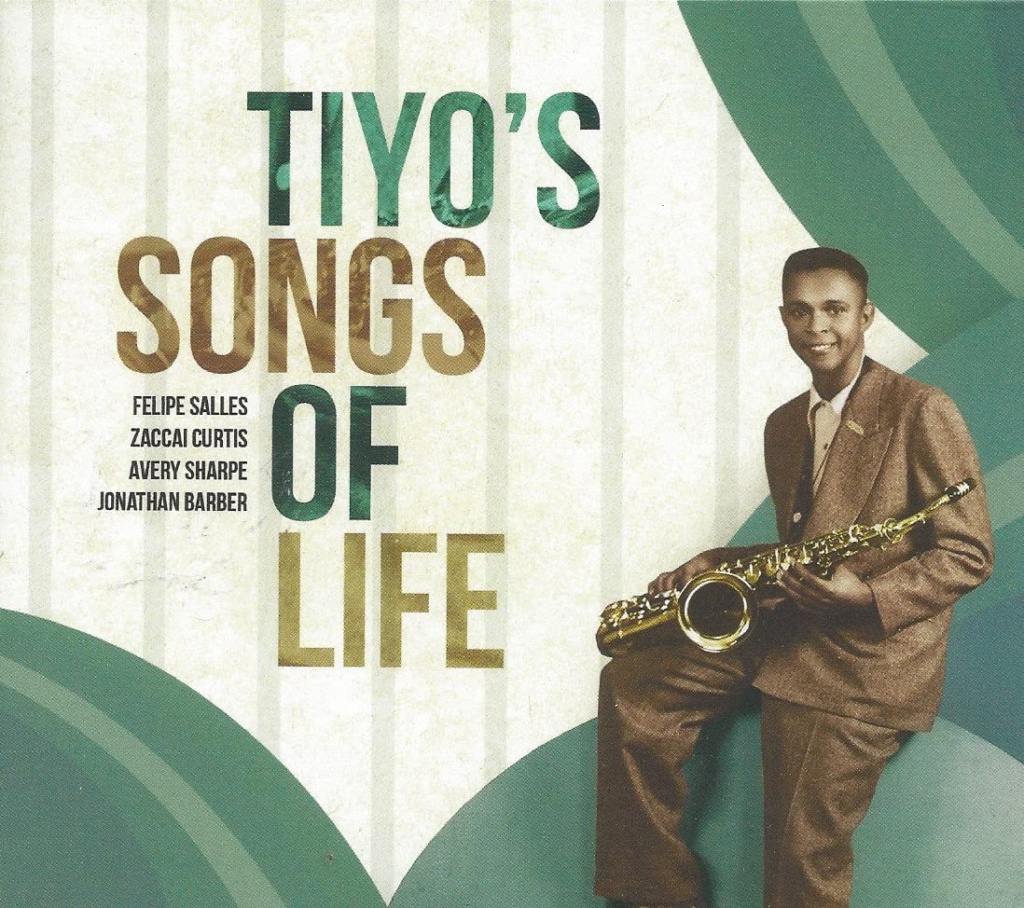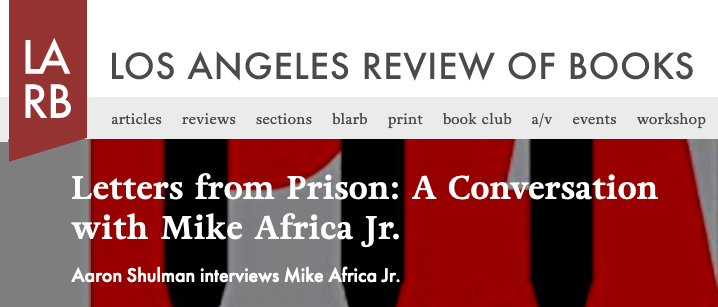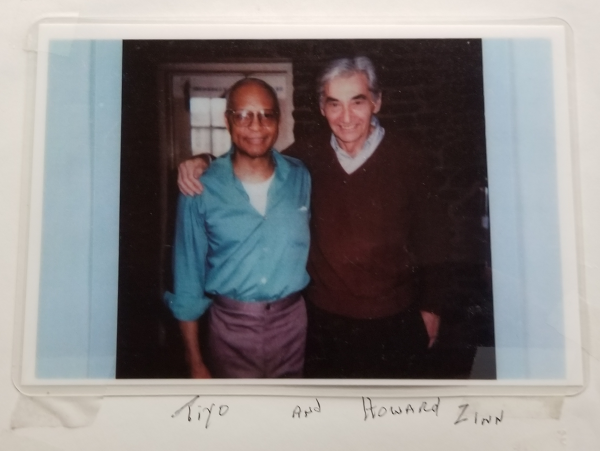
Tiyo Attallah Salah-El and Howard Zinn, undated. Source: Papers of Tiyo Attallah Salah-El (1890-2006)/University of Massachusetts Amherst.
I think also of Tiyo Attallah Salah-el, a Black man and a gifted musician, who earned several degrees while in prison, and is writing his autobiography. After corresponding with him for years, I visited him in a Pennsylvania penitentiary, and he leaped out of his seat to hug me, to tell me what he was doing and how he was resigned to live the rest of his life in prison but would not surrender to it, would play music and write and make the abolition of prisons his cause. (p. 149-150)
We share a 2009 letter Zinn wrote to Salah-El, one of many in Papers of Tiyo Attallah Salah-El (1890-2006) collection housed at the University of Massachusetts Amherst. Salah-El’s correspondence to Zinn are housed at the NYU’s Tamiment Library. See transcriptions below slideshow and a video of a memorial service for Salah-El held at University of Massachusetts Amherst in Oct. 2018. In 2022, the recording “Tiyo’s Songs of Life,” was released featuring musicians Felipe Salles (saxophone), Avery Sharpe (bass), Zaccai Curtis (piano), and Jonathan Barber (drums). The album was arranged and produced by Felipe Salles. Lois Ahrens, founding director of the Real Cost of Prisons Project is the executive producer.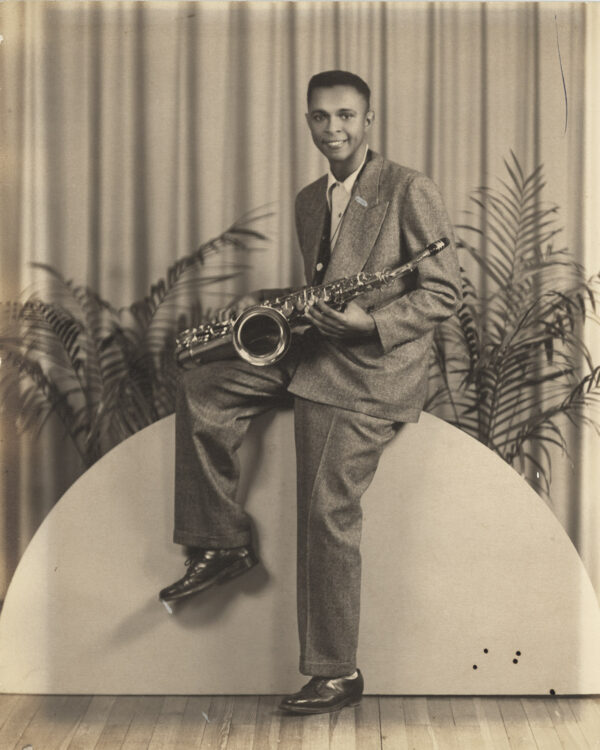 Tiyo Atallah Salah-El playing saxophone in high school. Source: Special Collections and University Archives/UMass Amherst.
Tiyo Atallah Salah-El playing saxophone in high school. Source: Special Collections and University Archives/UMass Amherst.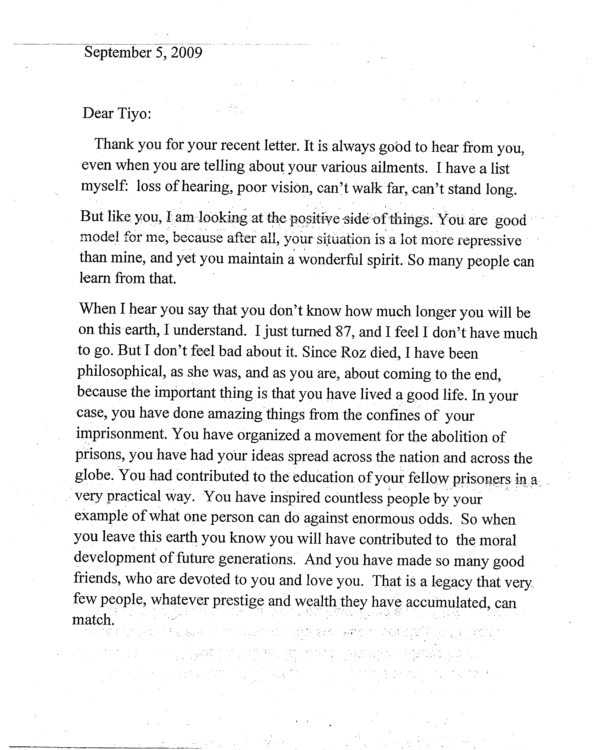 Letter to Tiyo Attallah Salah-El (Sept. 2009), page 1.
Letter to Tiyo Attallah Salah-El (Sept. 2009), page 1.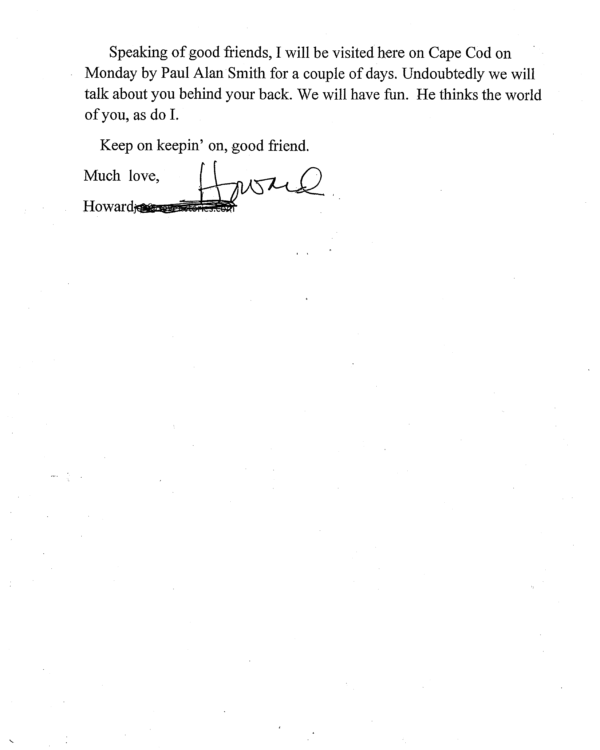 Letter to Tiyo Attallah Salah-El (Sept. 2009), page 2.
Letter to Tiyo Attallah Salah-El (Sept. 2009), page 2.
Howard Zinn Letter to Tiyo Attallah Salah-El (Sept. 2009)
September 5, 2009
Dear Tiyo:
Thank you for your recent letter. It is always good to hear from you, even when you are telling me about your various ailments. I have a list myself: loss of hearing, poor vision, can’t walk far, can’t stand long.
But like you, I am looking at the positive side of things. You are good model for me, because after all, your situation is a lot more repressive than mine, and yet you maintain a wonderful spirit. So many people can learn from that.
When I hear you say that you don’t know how much longer you will be on this earth, I understand. I just turned ’87, and I feel I don’t have much to go. But I don’t feel bad about it. Since Roz died, I have been philosophical, as she was, and as you are about coming to the end, because the important thing is that you have lived a good life. In your case, you have done amazing things from the confines of your imprisonment. You have organized a movement for the abolition of prisons, you have had your ideas spread across the nation and across the globe. You had contributed to the education of your fellow prisoners in a very practical way. You have inspired countless people by your example of what one person can do against enormous odds. So when you leave this earth you know you will have contributed to the moral development of future generations. And you have made so many good friends, who are devoted to you and love you. That is a legacy that very few people, whatever prestige and wealth they have accumulated, can match.
Speaking of good friends, I will be visited here on Cape Cod on Monday by Paul Alan Smith for a couple of days. Undoubtedly we will talk about you behind your back. We will have fun. He thinks the world of you, as do I.
Keep on keepin’ on, good friend.
Much love,
Howard
Book of Letters
Pen Pal: Prison Letter from a Free Spirit on Slow Death Row
By Tiyo Attallah Salah-el • Compiled and Edited by Paul Alan Smith
In 2004, Howard Zinn introduced a seemingly incongruous pair to each other: his “Hollywood Agent,” Paul Alan Smith, and his dear friend, Tiyo Attallah Salah-El, a Black man in a harsh Pennsylvania prison, serving life on what Tiyo describes as “Slow Death Row.” There followed an unprecedented correspondence between the two men, one that illuminates how profound friendships can grow out of unimaginable places. Before he passed in June 2018, he had sent 568 letters to Paul over the course of nearly a decade and a half. The 92 letters compiled here craft an extraordinary perspective, unlike any previously published, of life in prison and institutionalized racism in the United States. In addition to often humorous, philosophical, eloquent, and dramatic reflections on the myriad struggles he and other prisoners face—habitual racism, lockdowns, hospitalizations, brutal beatings, stifling heat and bitter cold, to name a few— Tiyo writes about his encounters with cancer, aging, and the sirens of personal demons. [Publisher’s description]
Learn more at O/R Books.
Recording
Tiyo’s Songs of Life
Nine original compositions by Tiyo Attallah Salah-el featuring musicians Felipe Salles (saxophone), Avery Sharpe (bass), Zaccai Curtis (piano), and Jonathan Barber (drums). The album was arranged and produced by Felipe Salles. Lois Ahrens, founding director of the Real Cost of Prisons Project is the executive producer.
Learn more at New England Public Radio.
Related Reading
Letters from Prison: A Conversation with Mike Africa Jr.
Excerpt from Los Angeles Review of Books Interview:
SHULMAN: Tiyo had many prominent white friends and supporters, such as Howard Zinn. Do you see any complications in white people on the outside sometimes taking up the cause of incarcerated people of color? Is there a fine line between true support and paternalism, and if so, what might be the keys to providing the right kind of support?
AFRICA: The color of one’s skin matters much less than their behavior. The inmates need relief, and as much as they would love to see it come from familiar faces, they are usually happy to accept it from people that don’t look anything like them.
Howard Zinn Speaks at Northeastern University
Feb. 16, 2001 • Northeastern University, Boston, MA • From MediaBurnArchive on Vimeo.
Please note: Audio only comes through one channel.
In this clip (20:16–24:43), Howard Zinn talks about visiting prisoners and the education he gets from these visits. Zinn shares about his friendship with Tiyo Attallah Salah-el and his work on prison abolition and “making the most of his time” (begins at marker 21:55).
My book became a favorite of prisoners. I was very proud of that. I thought my book would do more good in prisons than it did classrooms, you see. Then prisoners began writing to me and I began a long correspondence with prisoners, which itself was an education, just to get letters from people in prison, to hear from my friend Tiyo Attallah Salah-el. Some of you may know him, because he became, he started an organization. He’s a lifer, an actual lifer which means he knows he’s going to die in prison. He’s already been there 20 years. He said, “I’m going to die in prison. But that’s alright. I’m going to make the most of my time here.” So he starts an organization called Coalition for the Abolition of Prisons. And somehow he manages to put out a newsletter from his cell, and to make contacts with people all over the country from his cell. Amazing, amazing guy. And once I finally got to visit him—I was in Pennsylvania, I visited him—and he bounded into the visiting area like the happiest guy in the world. It’s an experience I’ve had again and again. I’m visiting someone in prison, and I’m very depressed, just going, just walking, just going through the things, and the prison, the spirit, you know. Obviously, prison either kills you or it strengthens you in resistance against the prison authorities. And Tiyo Attallah Salah-el was strengthened in spite of all the things they tried to do to him. And he’s a musician and he plays. He organizes a jazz band in prison and manages to get an hour a week in which they can play for the other prisoners.
These are amazing, amazing people. I mean, the people you meet with when you go to prison, and you meet prisoners, and you wonder, “What are they doing here?” You know, and…they did something, they committed a crime. But that was five years ago, 10 years ago, 15 years, 20 years ago, and that’s over and they’re punished and punished and punished. I mean, there’s, you know, there’s crime, the crime that people commit when they break the laws that are on the books, and that’s one crime. And then there’s the crime of punishment, which is, in many ways, the greater crime because the people who do the punishing have much greater resources at their disposal for punishment than individuals have for committing the crimes.
Memorial
Held at W. E.B. DuBois Library, University of Massachusetts Amherst on Oct. 5, 2018.
Sources
Tiyo Attallah Salah-El Papers, University of Massachusetts Amherst. Accessed Nov. 29, 2018: http://scua.library.umass.edu/ead/mums590
“Rest in Peace Tiyo Attallah Salah-El,” Angola 3 Newsletter, June 11, 2018. Accessed Nov. 29, 2018: https://www.indybay.org/newsitems/2018/06/11/18815621.php
Category: Tags: Prison


